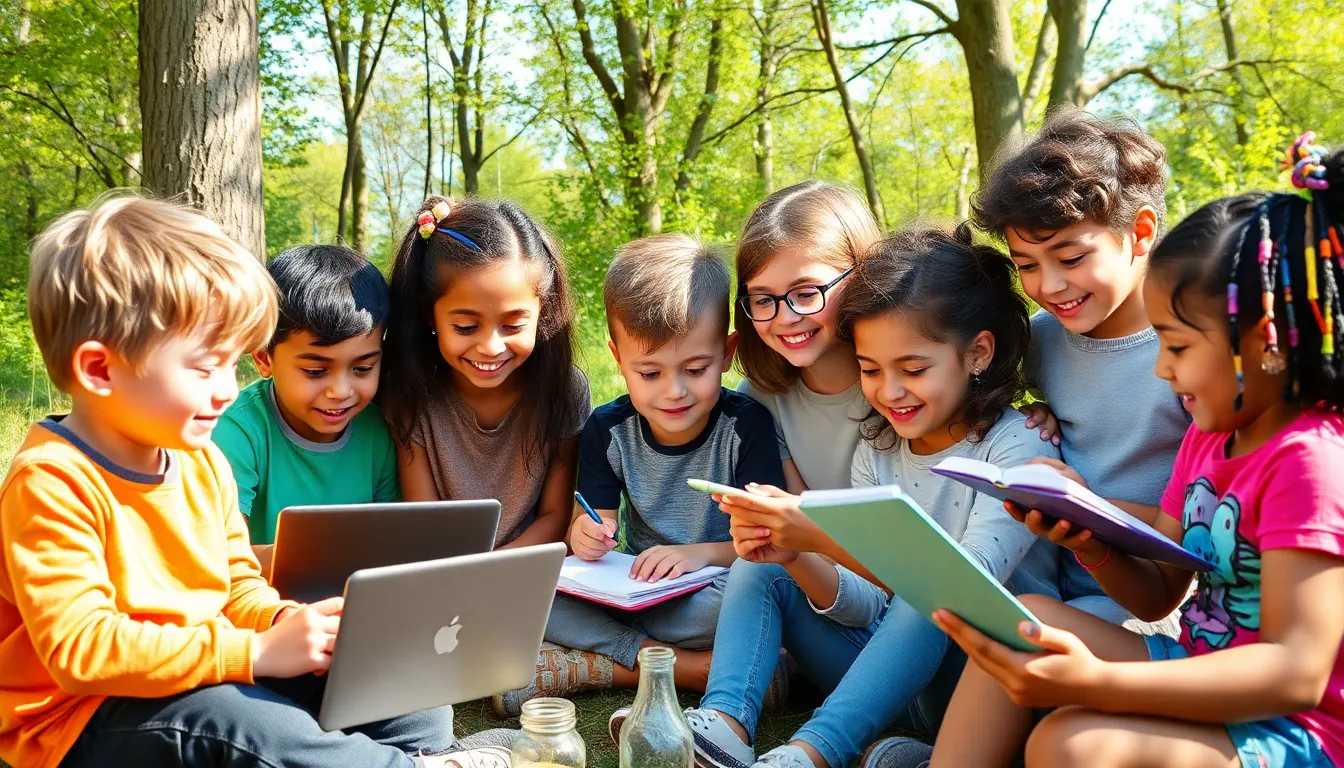Imagine a world where learning isn’t confined to a classroom, where curiosity reigns supreme and textbooks take a backseat to real-life experiences. Welcome to the fascinating realm of unschooling, where children explore their passions at their own pace. It’s like giving them a treasure map instead of a rigid syllabus, allowing them to discover knowledge through play, exploration, and genuine interest.
Unschooling flips the traditional education model on its head. Instead of sitting through lectures and memorizing facts, kids dive into subjects that spark their excitement. Whether it’s coding a video game or mastering the art of baking, unschooling empowers them to become lifelong learners. So, if you’ve ever wondered if there’s a more engaging way to learn, buckle up! Unschooling might just be the adventure you didn’t know you were looking for.
Table of Contents
ToggleWhat Is Unschooling?
Unschooling is a student-centered educational philosophy that emphasizes learning through life experiences. This approach encourages children to explore their interests at their own pace. Real-life situations often provide the primary learning opportunities, which contrasts with structured classroom environments.
Learners engage with subjects that captivate them, pursuing activities that spark curiosity. Examples include coding, gardening, or creative writing. These pursuits foster critical thinking and problem-solving skills, essential for lifelong success. Unschooling also encourages parental involvement, with parents acting as facilitators rather than traditional teachers.
In unschooling, children’s education doesn’t follow a rigid curriculum. Instead, the learning process is organic, adapting to each child’s unique interests and learning styles. Focus shifts away from grades and tests towards personal growth and achievement. This method cultivates intrinsic motivation, as students take ownership of their learning paths.
Resources abound for families embracing unschooling. Books, online communities, and workshops offer support and guidance. Many unschoolers also participate in local co-ops or group activities, promoting social interaction and shared learning experiences.
Unschooling fosters a love for learning by allowing children to connect with education in meaningful ways. It champions a tailored approach, recognizing that each learner possesses distinct passions and potential. This flexible method makes education relevant and engaging, helping children thrive in a rapidly changing world.
Principles of Unschooling


Unschooling relies on principles that prioritize individual exploration and organic learning experiences. These principles foster an educational environment where learners thrive.
Learner-Centered Approach
A learner-centered approach defines unschooling by placing individual interests and passions at the forefront. Children choose their subjects and activities, engaging in experiences that resonate with them. This approach encourages self-directed learning, as kids follow their curiosity, leading them to deeper understanding. They might explore coding, cooking, or writing based on personal enthusiasm. Consequently, this personalized learning method relies on real-life applications, creating connections between knowledge and practical use.
Importance of Trust
Trust serves as a cornerstone of unschooling. Parents and caregivers create an environment where kids feel safe to pursue their interests. Establishing trust empowers children, allowing them to take ownership of their educational journey. When parents exhibit confidence in their child’s choices, the learning process becomes more fluid and enjoyable. Communication plays a crucial role in nurturing this trust, fostering open dialogue between parents and children. Kids flourish when they sense support and encouragement, leading to meaningful learning experiences that extend beyond traditional frameworks.
Benefits of Unschooling
Unschooling offers several significant benefits, particularly in fostering personal growth through individualized learning experiences.
Fostering Independence
Unschooling cultivates independence by placing control in the hands of learners. Children make their own choices regarding subjects and activities. This approach encourages them to set goals and navigate challenges independently. As kids explore their interests, they develop critical life skills. Problem-solving and decision-making abilities flourish in an environment free from rigid structures. Learners often demonstrate increased confidence. This confidence stems from successfully pursuing their passions, guiding them toward a self-directed educational path.
Encouraging Creativity
Creativity thrives in an unschooling environment that prioritizes exploration. Learners engage in hands-on activities, often discovering unique ways to express themselves. The absence of conventional limits allows imagination to expand. For instance, children can create art, write stories, or experiment with technology. These creative pursuits often lead to innovative thinking and original projects. Unschooling nurtures a mindset where failure is viewed as a step toward success. This acceptance fosters resilience. As learners experiment and iterate, their creative talents can blossom, reflecting a genuine love for learning.
Challenges of Unschooling
Unschooling faces various challenges, impacting its effectiveness and acceptance in society. Understanding these obstacles is crucial for families considering this educational approach.
Societal Perceptions
Societal perceptions of unschooling often present hurdles. Many view traditional schooling as the only valid education method. Critics argue that unschooling lacks structure and may lead to gaps in knowledge. Parents and children may face skepticism or pressure from peers. Despite this, growing acceptance exists among alternative education advocates. Progressive communities increasingly recognize the value of self-directed learning. Support networks and online forums help unschoolers connect and share experiences, strengthening the movement.
Need for Resources
Resources for unschooling can be limited. Access to educational materials varies significantly by location. Families often need to seek diverse resources independently, including books, supplies, and workshop opportunities. Local libraries and community centers can serve as valuable hubs for learning materials and experiences. Parents must actively curate educational events and activities relevant to their child’s interests. Financial constraints might arise, as unschooling sometimes requires specialized programs or tools. Collaborating with other unschooling families can foster resource sharing, creating a more supportive network.




